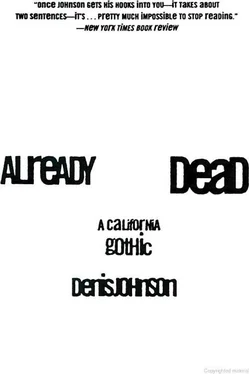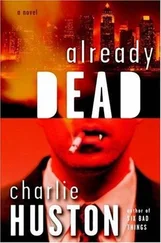After a while, Fairchild came out and drove away.
It sounded to Frank as if the little heap, a rickety Porsche, stood in need of potent ministrations. But it got Fairchild up the hill and out of sight and that was all Frankheimer cared about. He strolled back inside.
Melissa sat on the bed’s edge shivering. The whole business turned him on.
He stood in front of her until she took him in her mouth. In seconds, he came — he’d been screwing her for half an hour and hadn’t even been all the way erect; now the low-rent quality of the moment gave him ecstasy.
She turned her head, leaned sideways, and spat sadly onto the floor.
It made him feel like marrying her. This underfed wench he could usually take or leave. Women did, he seemed always to forget, have moments like stilettos. No telling when you’d be stabbed.
98 / Denis Johnson
“Why did you make me hide?”
“I told you to leave !” she said. “Not to hide!”
“Where am I gonna leave to, with no pants on?”
“Obviously to no-place. And then you come back inside and make me suck your cock!”
“Why did you make me hide?”
“Because,” she said, “he’s important to me. Now do you want to lie down with me? He won’t come back. Do you want something cold to drink?”
Frankheimer reached down under the bed, feeling around close to the wall. “I just came back in here for my clothes.” He was standing there buttoning his trousers and looking at Melissa’s very white features, her small, pretty mouth, when it hit him again — the astonishing persistence of the Yvonne problem. That hurt kept swimming up. He looked at his reflection melting in the cheap mirror and declared out loud: “Maybe I just need sincerity. I think that’s all I need.” All of a sudden, he understood that he was going to shoot up.
He happened to be carrying some crank, a quarter ounce of pebbly amphetamine he’d agreed to deliver to Harry Lally — but not to Harry Lally in Brazil. He could feel the bulge in his right-hand pocket. He’d really never cared for the stuff but it had a habit of presenting itself at certain moments. He consoled himself that he’d probably been intending this anyway. He’d been carrying his outfit around for days.
Melissa watched him, scowling. “Rape me, spy on my boyfriend, now you’re going to shoot cocaine.”
“I’m not doing coke. This is crank, not coke.”
“It’s all poison.”
“Frank’s on crank,” he said.
“So long. So long to your mind.”
“Would you lend me some money?”
“Good-bye and good luck to your brain.”
“I could use a little cash.”
“Do I look like I have some? Or even any?”
“Just a thought.”
Frank rummaged in her kitchen drawers and then bent the neck of one of her spoons to mix up in. The needle was barbed. He had to file it sharp on a matchbook cover. He liked the fascinated look on Melissa’s face.
Already Dead / 99
For a minute he sat with one leg draped over the other, holding the syringe between two fingers like a cigarette.
She was goofy and told him her goofy fears. “Nelson is going to do something about his wife.”
“Who’s Nelson?”
“Him. Nelson Fairchild. Don’t you recognize him, didn’t you work for him?”
“I laid the roof on his house.”
“There, you see?”
“I did the plumbing, too.”
“He’s going to do something bad. You see?”
“All I see is you don’t speak English.”
“He’s going to murder his wife.”
“Nelson Fairchild?”
“Nelson! Yes!”
He stuck a vein, introduced the crank and walked a half mile up to the ridge and four miles down to Point Arena feeling electric and friendly. When he got to town his legs just kept going.
Some kids in a Chevy van picked him up walking south along the cliffs. Ragged Metallica echoed out of their stereo’s speakers, but the black ocean contradicted all rock-and-roll. A bit farther down the coast the cloud cover dissolved, and he stepped from the van onto the sunlit sidewalk of Anchor Bay, two rows of buildings laid out on either side of the highway, which became the town’s main street for the distance of one city block. He’d built half these structures. He remembered measuring and cutting the wood for the counter in the Full Sails Cafe, the counter at which he sat now, spreading his hands out on its surface in front of him and feeling they were magnificent things and smiling at the waitress. He grabbed a napkin from the dispenser and wiped at his nose as a way of covering up his convulsive happiness.
The waitress said, “Catching a cold?”
“Oh…” He paused to consider the question. “Not necessarily.” He remembered he wasn’t hungry and hit the sidewalk outside, the thud of his feet on the pavement running up through his head and the screen door slamming with a thrilling rightness.
Across the street were the Laundromat and service station. A spiky-haired young boy stood by the gas pumps with his mouth open and his hands in his pockets. Frank believed he recognized the lad.
100 / Denis Johnson
He crossed the street, adjusting and readjusting his sunshades, and raised his hand in greeting.
“I was sorry to hear about your dad.”
“My dad? What about him?”
“Well, that he died, little friend.”
“My dad?”
“I knew him well,” Frank said. “He had a great tan.”
“My dad is right there. That’s him. He’s alive.” The boy pointed toward two men talking by the grease pit.
“Well, hell then, shit then. Who died? Somebody’s dad, I thought.”
“Not mine.”
He didn’t like this. Second thoughts started eating him and the clouds began to look like fists and the shadows like deep gashes.
Half-remembered things, words he hadn’t quite heard, details that hadn’t quite registered, suddenly swarmed over his consciousness. The connections proliferating, lighting up, formed a grid that fell down over his understanding like a net. He shook it off.
“Going to school, kid?”
The kid wouldn’t talk to him, and walked over toward his father instead.
Frank took a few paces to stand by himself at the edge of the street, taking note of everything around him. The cars, the people, any distraction at all. But random facts now coalesced in a geometry of crushing significance. Remarks, events, all of which had seemed by chance, suddenly became evidence. Things he’d heard, whispers. Words he was about to remember became tendrilous heads like those of sprouts, their mouths open. But nothing came out. They didn’t communicate telepathically. It was much more intimate than that.
He turned to the window behind him and looked through it. He saw the Point Arena cop doing the bad Laundromat thing, moving and folding clothes — bad because it’s all yours, all falling apart, like the universe — and it occurred to him that now was the time to go public with all this, time at last to seek justice through the system.
To the west, assuming they had Laundromats in Japan, it was seven thousand miles to the next nearest coin-operated cleaning machine. Four dozen miles north to the Laundromat in Fort Bragg, fifty miles south to the one in Jenner, several others Already Dead / 101
twenty-six miles due inland in Ukiah — over twice that far by the roads.
A long ways to a wash, any way you wanted to go. It irked Officer Navarro that he had to drive down here to Anchor Bay, nine miles from Point Arena, every time his socks smelled. Certainly he’d travel that far for a steak, a show, two minutes with any reasonably pleasant woman, but there was nothing to do in Anchor Bay — twelve buildings and a commercial campground set between Gualala and Point Arena, with a spectacular view of the Pacific — except sit in the one bar and have a few, then drive with an illegally high alcohol blood level back to Point Arena. And he really shouldn’t do that. He was off duty and wearing plain clothes at the moment, but everybody seemed to know him.
Читать дальше












